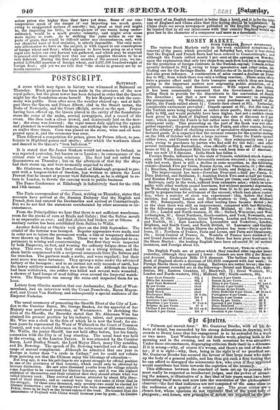The Paris correspondent of the Times, writing on Thursday, states
that accounts have arrived at the Russian Embassy that the English and French fleets had entered the Dardanelles and arrived at Constantinople. But we do not find the statement corroborated by other accounts or cir- cumstances.
From the Principalities we hear that there is not sufficient warehouse- room for the stocks of corn at Braila and Galatz ; that the Sulina mouth is as unpassable as ever; and that cholera had broken oat at Odessa. A sanitary cordon has been established from Sulina to Width.
Another field-day at Olmiitz took place on the 26th September. The citadel of the fortress was besieged. Regular approaches were made, and in order not to injure the permanent works, a line of temporary defences were thrown up without the walls. These were to be subjected to ex- periments in mining and countermining. But first they were inspected by both Emperors, on foot, and wearing the ordinary fatigue-dress of the army. This over, they took their stand on a -strong tribune, and the sham battle commenced with a reciprocal cannonade fora the fortress and the trenches. The garrison made a sortie, and were repulsed; but their next move was more fortunate. They sprung a mine under the advanced battery of the besiegers ; and in an instant not only mounds of earth, but the heavy artillery mounted on it, flew into the air. Although the troops had been withdrawn, one soldier was killed and several were wounded ; a shower of hard lumps of mud falling even around the Imperial watch- tower. The Emperors ran among the ruins and inspected them for an hour.
Letters from Olmiitz mention that our Ambassador, the Earl of West- moreland, had an interview with the Count Nesselrode, Baron, Mayen- darf, and Count Von Budberg, and subsequently a special audience of the Emperor Nicholas.


























 Previous page
Previous page